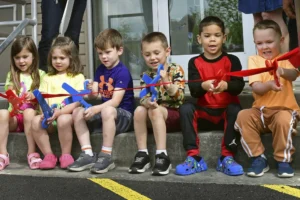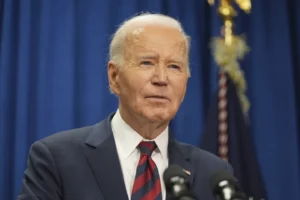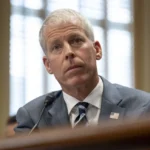Solving Wyoming’s Teacher Shortage
Legislative committee discusses ways to encourage teachers to keep at it, despite challenges in student mental and behavioral health
- Published In: Politics
- Last Updated: Aug 10, 2023

Rep. Ryan Berger (R-Evanston) visits with colleagues in the House Chambers at the Wyoming State Capitol in January. Berger sits on the Joint Education Committee, which discussed teacher retention and recruitment Wednesday. (Photo by Michael Smith)

By Carrie Haderlie
Special to the Wyoming Truth
Last year, Lincoln County School District #1 couldn’t find a high school English teacher, so a long-term substitute taught all year at Kemmerer Jr.-Sr. High School.
“This year, we couldn’t hire a math teacher, so we have a science teacher with an exceptional authorization teaching math,” Teresa Chaulk, superintendent of LCSD 1 told the Joint Education Committee Wednesday morning during discussion on teacher retention and recruitment.
The rural southwestern Wyoming district is not alone. Many places in the state have recently faced teacher shortages.
Laurel Ballard, innovations officer for the Wyoming Department of Education (WDE), told the committee that the recent work of a Teacher Retention and Recruitment Task Force focused heavily on supporting teachers already employed in the state’s schools. Rep. Ryan Berger (R-Evanston) said that while he understands recruitment is an issue, he hoped to find a way to reward Wyoming teachers who have stuck it out during a difficult few years in education.
“Of course we want more people, to attract them, but what about those [teachers who stay in their jobs?],” Berger asked.
The task force recommendations were designed to improve the education workforce, highlighting professional development, mental health issues and re-envisioning education, according to the WDE. The department partnered with the Professional Teaching Standards Board (PTSB) to lead the task force, which was composed of teachers, school districts and postsecondary representatives.
“We have taken in significant stakeholder input as we created these recommendations,” Ballard said. “We have … 40 people on the task force itself representing people across Wyoming.”
Robin Grandpre, project and performance manager for the WDE, said the recommendations were developed with input to “help educators feel more valued and respected.”
Tangible action items include an increase in opportunities for Wyoming teachers to earn micro-credentials as professional development, along with the creation of a school leadership academy.
“Teachers love mentorship,” Grandpre said. “They felt that they needed more for school leaders. There wasn’t really anything out there across the state to help those new administrators come into the school.”
The task force also tackled the issue of mental health and included recommendations for developing a system for screening and identifying children with mental and emotional well-being needs before kindergarten.
The task force noted, Ballard said, that “much of what [educators] are dealing with are behavior issues in the classroom,” some related to mental health.
“Their request was to have at least one mental health professional and one behavioral specialist at the elementary school for every 250 students, and then having one school psychologist and one behavioral specialist for every 250 students at the middle school level,” Ballard said.
Sen. Charles Scott (R-Casper) asked if that would be achieved by hiring additional staff within districts or by contracting with other services, as he’s seen happening in Casper school districts.
“Frankly, that is a big resource issue,” Scott said, adding that any funding mechanism for new positions would have to be discussed at a future date.
During public comment, Chaulk pointed out that there are access issues for rural communities, especially when it comes to mental health services. Contracting with private providers, she said, can be difficult.
“If you live in a larger community, you have access [to mental health services]. But if you live in a remote community, you do not have access to that, unless via Zoom or if you are transporting your child an hour each way,” Chaulk said.
Another recommendation by the task force would be to compensate certified staff at 85% of comparable professions, Grandpre said, with ongoing cost of living increases.
The task force recommendations are aimed at ensuring Wyoming educators are able focus on the whole child, Ballard said, because when a child who is suffering or experiencing behavioral challenges can affect an entire classroom.
“They talked about the importance of focusing on the whole child,” she said. “You cannot just focus on academics.
“If I am a kid in a classroom and I am acting out, and I am a kid with 20 other kids, it is really hard to address the academic needs of all the students there if we are not addressing the behavioral needs,” Ballard said.
Sen. Bo Biteman (R-Ranchester) asked Ballard whether the “whole child approach” was the same as “social emotional learning” and whether she felt things were getting “better or worse” in Wyoming classrooms.
“The reports that I hear from school districts, especially since COVID, is that behaviors are certainly getting worse and mental health needs are getting worse,” Ballard said.
Biteman continued that, perhaps, social emotional learning is not an effective strategy.
“Maybe going back to an academic approach, dealing with behaviors like we used to, removing them from the classroom for being disruptive and focusing on academics,” he said.
Read the full recommendations of the Teacher Retention and Recruitment Task Force here.













